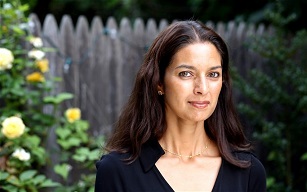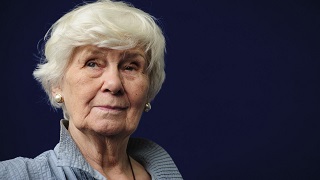De Amerikaanse schrijfster Jhumpa Lahiri Vourvoulias werd geboren op 11 juli 1967 in Londen. Zie ook alle tags voor Jhumpa Lahiri op dit blog.
Uit: Unaccustomed Earth
“After her mother’s death, Ruma’s father retired from the pharmaceutical company where he had worked for many decades and began traveling in Europe, a continent he’d never seen. In the past year he had visited France, Holland, and most recently Italy. They were package tours, traveling in the company of strangers, riding by bus through the countryside, each meal and museum and hotel prearranged. He was gone for two, three, sometimes four weeks at a time. When he was away Ruma did not hear from him. Each time, she kept the printout of his flight information behind a magnet on the door of the refrigerator, and on the days he was scheduled to fly she watched the news, to make sure there hadn’t been a plane crash anywhere in the world.
Occasionally a postcard would arrive in Seattle, where Ruma and Adam and their son Akash lived. The postcards showed the facades of churches, stone fountains, crowded piazzas, terra-cotta rooftops mellowed by late afternoon sun. Nearly fifteen years had passed since Ruma’s only European adventure, a month-long EuroRail holiday she’d taken with two girlfriends after college, with money saved up from her salary as a para-legal. She’d slept in shabby pensions, practicing a frugality that was foreign to her at this stage of her life, buying nothing but variations of the same postcards her father sent now. Her father wrote succinct, impersonal accounts of the things he had seen and done: “Yesterday the Uffizi Gallery. Today a walk to the other side of the Arno. A trip to Siena scheduled tomorrow.” Occasionally there was a sentence about the weather. But there was never a sense of her father’s presence in those places. Ruma was reminded of the telegrams her parents used to send to their relatives long ago, after visiting Calcutta and safely arriving back in Pennsylvania.
The postcards were the first pieces of mail Ruma had received from her father. In her thirty-eight years he’d never had any reason to write to her. It was a one-sided correspondence; his trips were brief enough so that there was no time for Ruma to write back, and besides, he was not in a position to receive mail on his end. Her father’s penmanship was small, precise, slightly feminine; her mother’s had been a jumble of capital and lowercase, as though she’d learned to make only one version of each letter. The cards were addressed to Ruma; her father never included Adam’s name, or mentioned Akash. It was only in his closing that he acknowledged any personal connection between them. “Be happy, love Baba,” he signed them, as if the attainment of happiness were as simple as that.”

Jhumpa Lahiri (Londen, 11 juli 1967)

